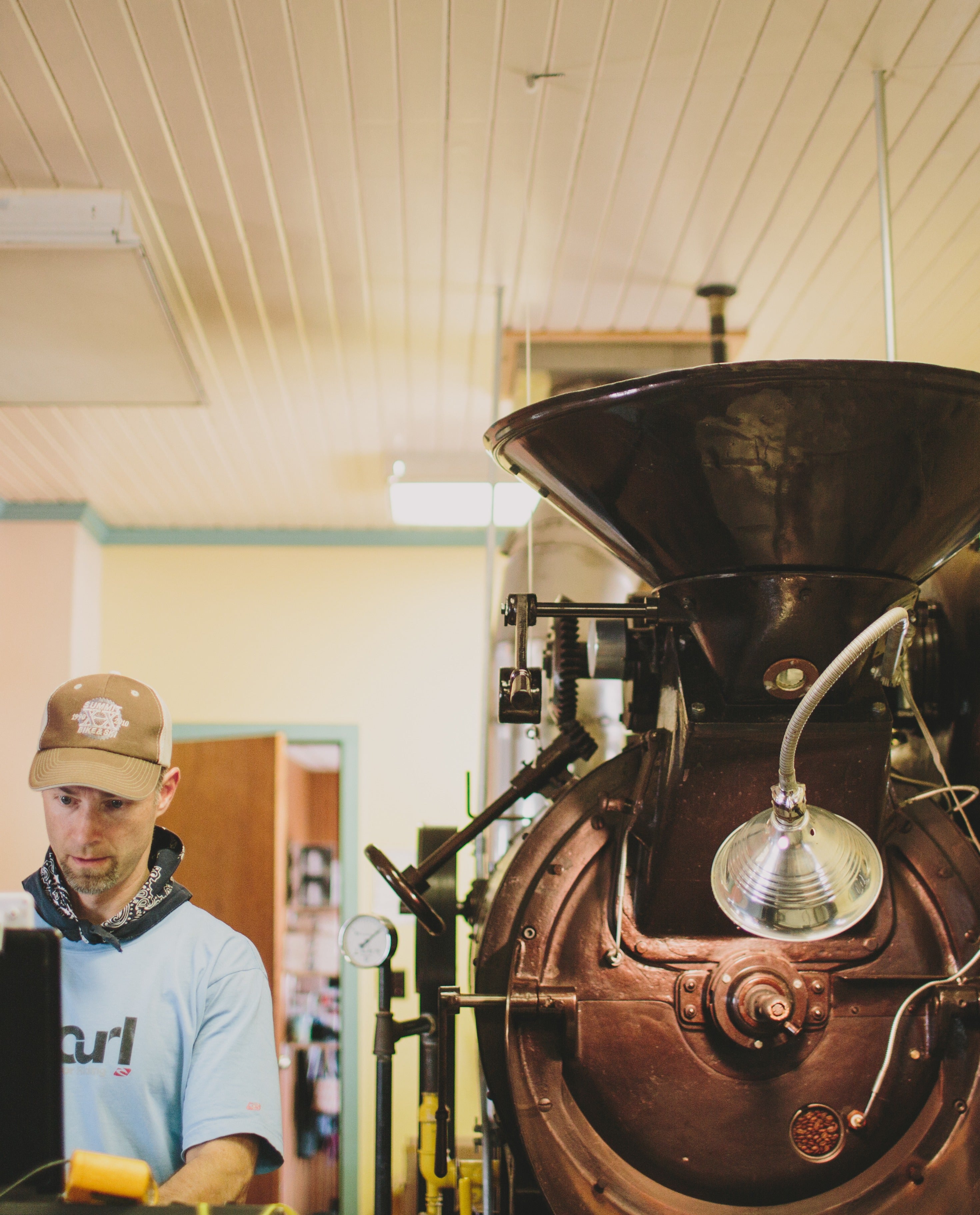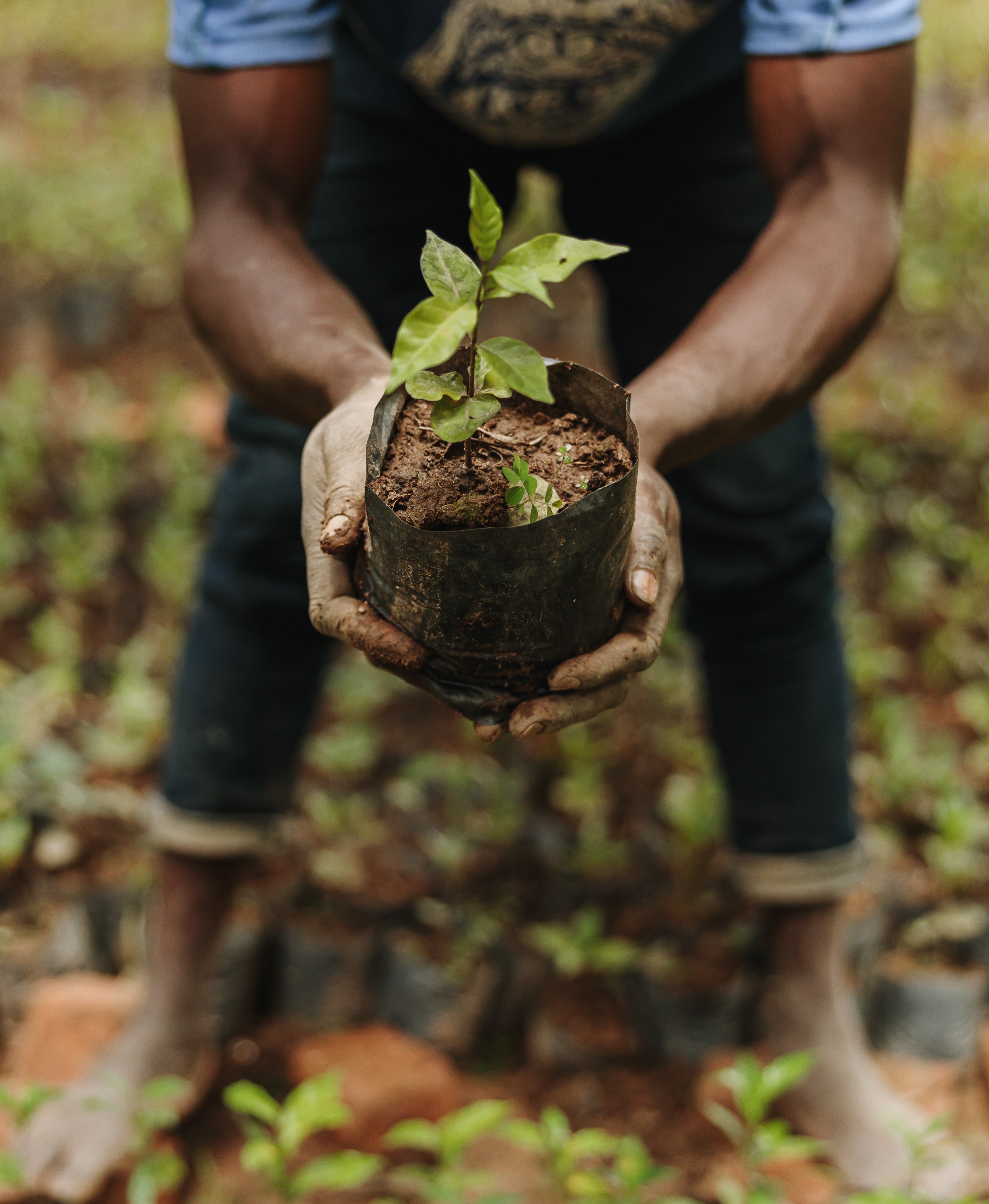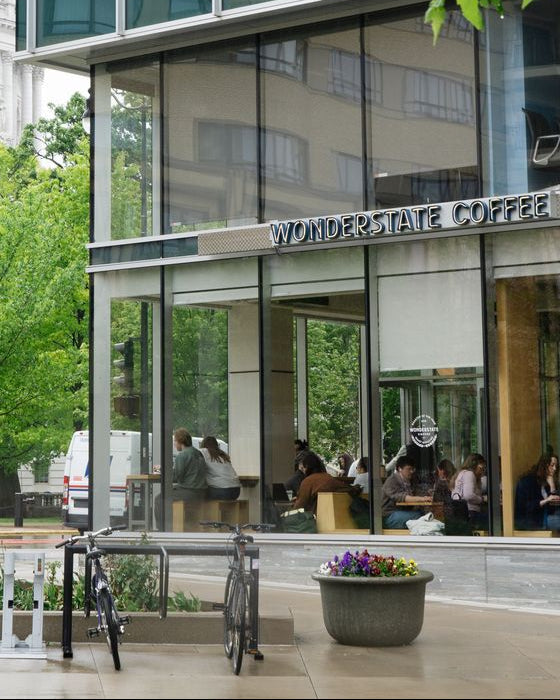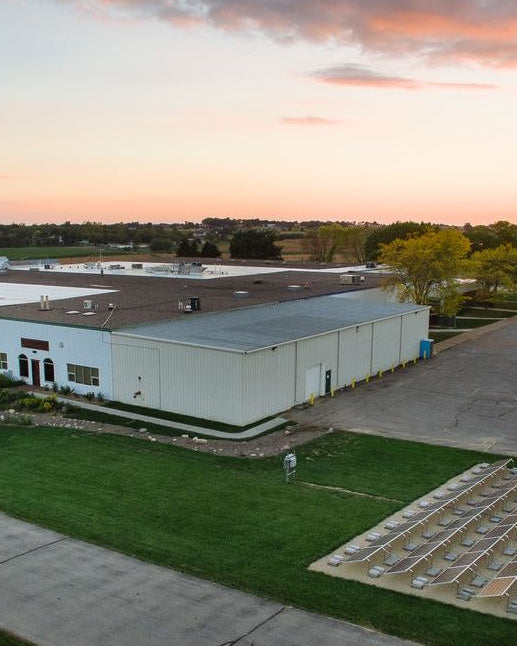Challenging Gender Bias Across the Coffee Supply Chain
We drop the first batch at 8am, flames licking the drum of the roaster. The parking lot quickly fills with the aroma of slightly burnt toast and the music is cranked up in the back––the bass reverberating against the glass that separates the roasting facility from our cupping lab.
But an hour before that first drop, at 7am, Jackie is already hard at work. Head down, Jackie thinks through the movements of the day, knowing that a fat stack of orders will soon clutter her desk. “I like that production is like a little puzzle,” Jackie tells me, “there are the same moving parts, but they always come together in a different way.”

Jackie looks on from her perch in the production area.
Jackie Barnes is Kickapoo Coffee's Production Manager, directing the team from roast to fulfillment. After joining us back in April of 2017 as a roasting and production assistant, Jackie quickly became indispensable. Despite the fast pace of her days, Jackie appreciates how relaxed she can feel in her work. When she first started at Kickapoo, Jackie explains, “I was pleasantly surprised by how much emphasis was placed on having a work culture that makes you excited to come to work.” She also felt encouraged to grow in her role, quickly rising to a leadership position.
–
With a 50:50 split of women to men in full time positions, Kickapoo Coffee's Roastery is somewhat of an anomaly in the male-dominated specialty coffee industry. Defined by closeness and fraternity, our industry likes to think of itself as a family. But too often it can feel like a boys’ club.
From farmers at origin to your local barista, men tend to dominate positions of economic and managerial power.
But we have the opportunity to change this, to demand a cultural tide shift that supports women across the supply chain.

Meghan Reida, cafe coordinator at our Milwaukee Third Ward location, prepares a pourover. Photo by Ray Siler.
Movements like #CoffeeToo, inspired by the national #MeToo movement, are raising the profile on the coffee industry’s masculine culture and the gender-based harassment faced by some of its women employees. This has created some much needed buzz to push the coffee industry to evaluate its practices and expectations. But we’re missing a key element when we don’t recognize how #CoffeeToo overlaps with issues of gender equity at origin.
It’s easy to split the conversation for the sake of simplicity––divorcing struggles facing producers abroad from the challenges faced by the domestic coffee roasters and industry’s employees. But when we do this we miss an opportunity to elevate the conversation, to find a common narrative among the various communities that are tethered to the long and complex coffee supply chain.
–
For women at origin, gender inequality is less often perceived as an issue than an inescapable fact. Despite providing the majority of the upfront agricultural labor along with all household work, women coffee farmers rarely see any money for their labor. A recently re-published Specialty Coffee Association (SCA) white paper on gender equity in agriculture noted that while women often “play major roles at the initial segments of the value chain, laboring in the field, harvesting and processing,” men hold more influential roles of transporting and marketing the coffee. As a result, despite making up an average of 70 percent of the agricultural workforce in coffee-producing countries, women only participate in 10 percent of roles in domestic trade and export (ITC, 2008).

Women pick through beans drying on raised beds in Ethiopia.
Women are also often barred from influencing decision making, both within their households and within cooperative structures and policy-making organizations, limiting their ability to change labor structures. Not only does this mean women aren’t given a say in the distribution of household income, it also means women are not able to direct profits towards growing and improving their farm. (For a snappy overview, see the SCA’s recently released video).
Coffee-centric nonprofits and businesses in the coffee industry are working to shift the status quo at origin. In the fall of 2015, the Coffee Quality Institute (CQI)’s Partnership for Gender Equity (PGE) published its report, The Way Forward: Accelerating Gender Equity in the Coffee Value Chain. In the report, CQI’s Kimberly Easson made clear the importance of pairing gender equity advocacy with the coffee industry’s financial success. The report’s co-author, Susan Cote, explained to Sprudge, “ultimately, those efforts that are most sustainable are those that make business sense, that make sense for all the stakeholders.” By placing the conversation of gender equity in the supply chain within the context of economic success and improved coffee quality, gender equity becomes less of a “niche” advocacy project.
When the perpetuation of gender inequity is recognized as a threat to the long-term success of the specialty coffee industry as a whole––much like global warming, an aging farming population, secure access to water, or the spread of plant diseases like La Roya––action becomes unavoidable.
While approaching culturally-sensitive issues of women’s roles and expectations are more complex than digging a well or offering agricultural trainings on mitigating the spread of disease, that doesn’t mean they can be ignored. Easson argues that creating space for these conversations often requires developing collaborative and exploratory methodologies that pair gender equity training with financial incentives. If you work with farmers to let them to see for themselves that combating gender inequality can not only yield a higher-quality crop but also increased access to a specialty market that will pay more for the assurance that gender equity measures are in place, those farmers are provided two very tangible, financial reasons to engage in transforming coffee production culture.

Coffee from Project Congo labeled in storage as "women coffee."
A success story can be found in On the Ground’s GALS [Gender Action Learning System] program in the Democratic Republic of Congo. In 2014, On The Ground, a nonprofit which supports sustainable community development in coffee communities around the world, introduced the community-led education and empowerment workshop series. With the hopes of “break[ing] the cycle of poverty” faced by Congolese farmers through gender equity training, the GALS program addresses gender inequity through the lens of agricultural success.
Former program participant and Congolese coffee farmer, Kambale Mulengero David, explained in a interview published by On the Ground that before the program, “I couldn’t reach any goal...[M]y life was very bad, only my wife could work in the farm and my job was to sell and drink without helping her to work... [T]he culture was in my head that a woman was an object, she couldn’t talk or make a decision.” GALS looks at fundamental gaps in educational opportunities, access to land ownership, and influence in household finances, as well as the stark prevalence of gender-based violence in the country, and tethers this inequity to concrete financial and managerial concerns on the coffee farm.
Through a series of conversations and trainings, participants come to see that an equitable farm, where both partners are involved in decision-making processes, educational opportunities, and money management, can yield a more profitable farm. And the impact this has had on the quality of life for women in these communities? When asked about how the GALS training had affected her life, Congolese coffee farmer and GALS graduate Noella Nabushanja put it simply:
“I have got the human dignity that I lost without knowing for years.”
–
This culture of male deference is not limited to these distant farming communities. At last year’s Specialty Coffee Expo in Seattle––one of the largest national gatherings of specialty coffee professionals––women swapped stories of gender discrimination, workplace harassment, and a general discomfort at often finding themselves as the only women in their place of employment. From panel discussions, to informal conversations, to the “We Can Do It” women-led tech training at La Marzocco with The Coffeewoman, it became clear that efforts to address gender equity in coffee demand cultural transformation and industry-wide support across the supply chain.

Kickapoo Cafe Viroqua co-owner, Allison Sandbeck, mingles with customers at the cafe's grand opening in 2017. Photo by Ray Siler.
The buzz has turned into a movement. By stitching together the struggles of women across communities, countries, and positions within the coffee industry, we gain momentum. The conversation becomes a series of actions and those actions begin to shift power structures, reinforcing new expectation around coffee culture and gender bias. As Kickapoo Coffee’s very own Sales & Marketing Director, Jamie Lamonde put it,
While there is a clear acknowledgement by the specialty coffee industry as a whole for the need to change the status quo both at origin and at home, clear and direct action is hard to intiatiate. How do you work collaboratively to shift gender dynamics within coffee-producing communities while recognizing your position as a privileged outsider? How do we move beyond being conscious of our hiring strategy and truly combat gender bias culture in the roastery and coffee shop setting?
We’re far from answering these complex questions, but here at Kickapoo Coffee we think it’s important to show up for the conversation and to be honest about where we need to grow. Our efforts can seem small in isolation, but we hope that our work at our roasteries and cafes along with our continued commitment to support efforts at origin such as On the Ground’s Project Congo, motivates our friends and peers in coffee to join us in pushing the issue. We’ve never settled for good enough, why would we now?
___
Are you interested in digging in to the conversation on gender equity? Join us at our cafe in Milwaukee’s Third Ward neighborhood on March 31st for Coffeewomxn Unite!, an evening of networking, brainstorming, and future-planning for womxn and non-womxn alike engaged in the world of coffee.
For more details, head to our Classes & Events page.
Read more
This last week, we had the pleasure of watching this micro-lot from Agustin Gomez Hernandez roll into the roastery. It’s an incredible feeling to visit a coffee as it’s being harvested and then se...
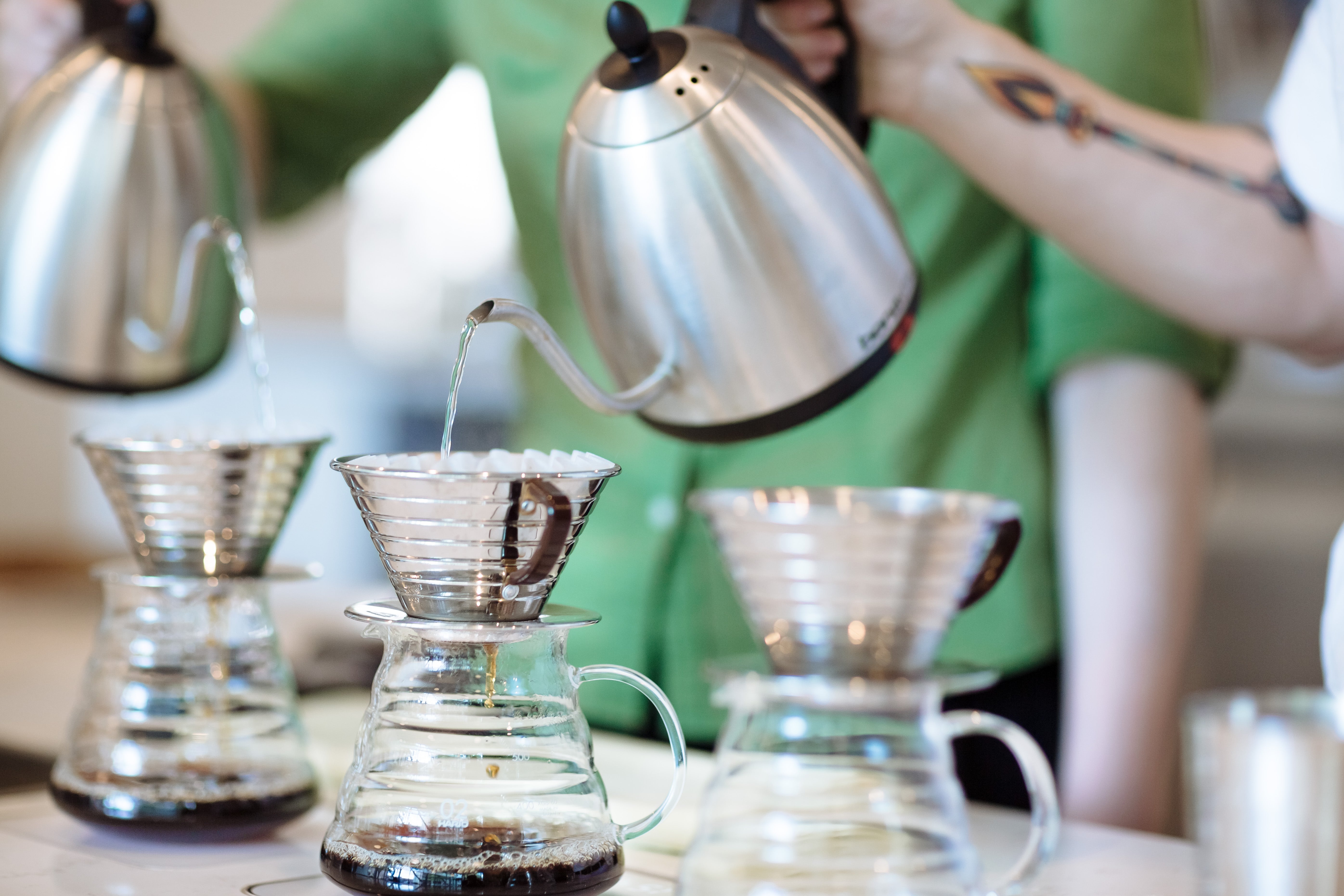
COME VISIT US IN BOSTON! We’ll be at it again this year at the Specialty Coffee Association’s annual Coffee Expo. The Expo gives us a chance to meet up with our customers and friends, swap storie...


